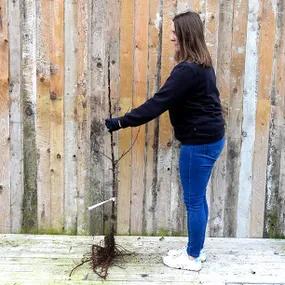Kingston Black Apple Trees

The details
- Cider: Bittersharp vintage.
- Spur bearer
- Not self fertile.
- Pollinator
- Pollination Group D.
- Harvesting: early November.
- RHS Plants for Pollinators
Recommended extras
Description
Kingston Black Cider Apples
A great variety that large scale cider makers have forgotten about, Kingston Black cider apple trees are all about quality over quantity. The fruit are small and conical and can be deep orange or maroon in colour. The juice has a highly aromatic bittersharp flavour, just perfect for cider. In fact, we would go so far as to say that Kingston Black apples are one of the best vintage cider apples around. While the trees are fairly vigorous, they are slow to start producing fruit and have lower yields than most other similar trees. Given that you won't need any other apples to make top-notch cider, these characteristics shouldn't be such a problem. Another reason that they have fallen out of favour with farmers is that they are more susceptible to scab than some, especially if you live in the south-west.
They are ready to pick from late October to early November, and should be left to "sweat" in a cool dry place for ten days (but not longer) before processing, which mellows the flavour.
- Cider: Bittersharp vintage.
- Spur bearer
- Not self fertile.
- Pollinator
- Pollination Group D.
- Harvesting: End October - early November.
- RHS Plants for Pollinators
Browse our range of apple trees or the full variety of fruit trees.
Pollination Partners for Kingston Black
If you have several apple trees to pollinate or feel at all unsure about choosing a suitable partner, go for a crab apple like the Golden Hornet or John Downie varieties. Kingston Black flowers in the mid-season and is therefore a match for any of the fertile trees in the Apple Tree Pollination list, in particular with those that are also listed as mid-season.
Kingston Black Rootstocks
Because we use MM106 rootstocks for our apple trees, you can grow a medium-sized tree, a shorter bush or any of the various trained forms, like cordons and espaliers.
Have a look at our quick guide if you are new to brewing cider at home.
Planting Instructions
Did You Know?
This 19th century variety originated around Kingstone near Taunton in Somerset, and is also known as Black Taunton. In his book, The Apple and Pear as Vintage Fruits, published in the 1880's, the pomologist Robert Hogg called it "a very valuable variety", and recounted the tale of a Mr Palmer who sold his entire estate at Bollitree in Herefordshire, apart from the Kingston Black orchard, which was a nice little earner for him at three shillings a gallon of cider produced!

 Img 1.webp)
 Img 1.webp)
 Img 2.webp)
